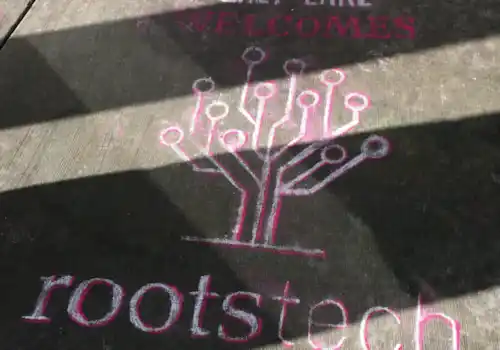04 February 2019
|
Nick Duerden reveals what inspired him to delve into his family's past – a quest that led to him writing a memoir – and why it's never too soon to start filling in the gaps in your family's story.
Nick Duerden reveals what inspired him to delve into his family’s past – a quest that led to him writing a memoir – and why it’s never too soon to start filling in the gaps in your family story.
At the very moment it seemed that losing my grandmother imminently was a distinct probability – she was a widow in her mid-90s by then and had recently entered a care home – I found myself wanting to get to know her again, but properly now, filling in all the blanks that existed between us, all the things I still didn’t know.
In many ways, she was a mystery to me, a woman who had lived half her life before the time I came along, and who held her secrets close. In her memoir, A Life of My Own, Claire Tomalin writes: ‘People are spurred to write by the death of parents, as though they feel suddenly they must catch it now, before things fade too far into the distance.’
My own mother had been dead for over a decade, and once my grandmother was gone, the door would close. I wanted to get to know them both, because if not now, I thought, then never.
Could I still find the answers?
We take for granted those things that are always around us, the people that are always there. There was drama in my family’s past, and ruptures between the generations that had wrenched them apart. I was sure that that the stories would fascinate me, compel me, so why had I not tried to find out about them sooner? Could I still find answers?
I knew that, on a societal level, interest in our own personal genealogies is on the increase, that more than a third of all Britons have now attempted to trace their ancestors online. Perhaps because we live in a world that is becoming more diverse and increasingly fragmented, we know that we are losing something important, and that our sense of identity is evaporating.
Personal histories are slippery things. Our own might mean precious little to us for great chunks of our lives, but at some point, they will. At some point we will have questions for which we crave answers.
The start of a plan
I started to plan. I contacted an old family friend who told me, a little warily, that, yes, she would be prepared to answer the questions I had about my mother in her younger life, and also to provide me with information about my grandmother. 'I don’t know much, but whatever I do know, I’ll tell you,' she said.
A family history journey
Before we were due to meet, I took my family to visit my grandmother in her care home an hour north of Milan. It was July, high summer, and we were there for a week. Care homes and young children make for an uneasy mix, and so one day we hired a car and drove to Slovenia, my grandmother’s place of birth, in pursuit both of further clues and things to do with the kids. If nothing else, this would kill a few hours. They could look out of the window, point at the trees. It would be, I fancifully hoped, fun.
She had lived in a tiny town 50 miles outside of Ljubljana, in an ancient house I had visited infrequently, maybe no more than three or four times over the previous four decades. I remembered the house as old, quaintly outdated even then, the whole place heated by a furnace located in what I seem to recall was the 'black kitchen' (black from all the soot). Until the early 1980s, it didn’t have an indoor toilet, and milk came from the next door neighbour’s cow rather than the local shop, because the nearest shop a 20-minute drive away.
When we arrived, I barely recognised the place. Where once there had been isolated houses dotted sporadically here and there, there were now many more, modern and smart, each with paved driveways and, in place of the tractors I remember, smart German saloon cars. There were shops, a supermarket. Fewer cows. We followed the road that led into the hills where the house was, or had been, and then stopped abruptly when I saw what I thought was a mirage. There it was, precisely as I had remembered it, in its own field, painted freshly white under a thatched, sloping roof. It looked untouched, as if forgotten, yet clearly preserved. We parked on a dirt track, then walked through the high grass towards it, the sun hot on our backs.
Peering through the windows was like witnessing a three-dimensional unfolding of my memory: the same sparse furniture arranged in the same spartan way, the same wooden chairs, the same trinkets on the mantelpiece. It reminded me now, as it did years ago, of The Waltons, of Little House on the Prairie – of how people used to live before they invented carpets, wallpaper, television.
'Is there Wi-Fi?' wondered my 10-year-old daughter.
At approximately the same time that my eight-year-old pointed out an elderly man in elderly clothing walking across the field towards us, my wife drew our attention to a blue plaque affixed to one wall, commemorating the fact that the house, designed by my grandfather’s cousin, a famed local architect who was subsequently interred in a concentration camp during World War II, was now a site of historical importance, the perfect example of the kind of homes that were made in this region a century previously.
The place, then, was a living museum, and I had had no idea.
The elderly man was upon us now, grinning in welcome to reveal teeth that hadn’t seen a dentist in decades. I asked him, in Italian, if he spoke Italian. He answered me, in Slovenian, that he didn’t. English? I wondered. Helpfully trying to meet me halfway, he offered instead: 'Deutsche?' We ultimately made do with semaphore, and the raised voices that people with no lingua franca invariably employ when no other option presents itself, and from this he was able to discern who I was, and my relation to this place. I mentioned my mother’s name, Natasha, and he broke out into a smile of recognition.
Then, from the front pocket of his dungarees, he produced a large iron key, the kind found in fairy tales. By now we were all rapt with anticipation, this previously aimless day out suddenly taking on a historical significance I kidded myself my children might remember in years to come.
He put the key into the lock, turned it, and the door swung open. The past rushed out to meet me. We stepped inside.
• The Smallest Things: On the Enduring Power of Family by Nick Duerden (published by Elliott & Thompson, RRP £12.99 in hardback, £9.49 on Kindle). Nick’s book is reviewed in the March 2019 issue of Family Tree.
All images © Nick Duerden.













.jpg)
